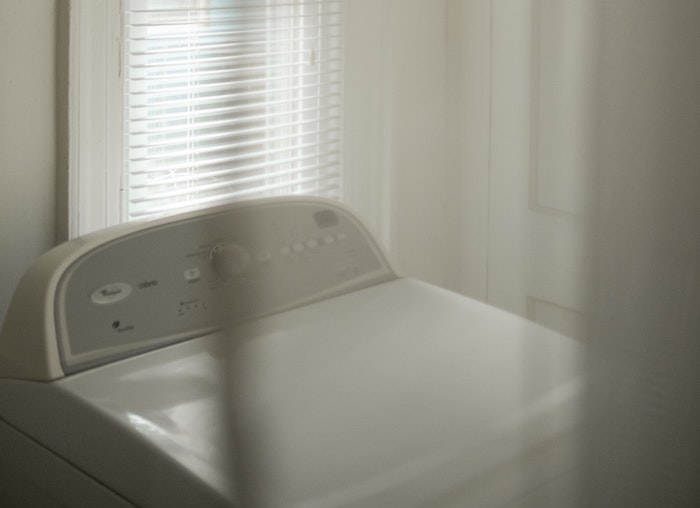You are probably short of space for your washer in the house. You may be toying with the idea of placing your washer outdoors. However, there is the worry of weather elements such as rain and sun, and their effects on your appliance.
So then, can the rain damage the washer? The answer is yes. If you let your washer be rained on, the inner parts such as the motor and the control panel will be damaged because the washer is not waterproof. Additionally, the metal parts will begin to rust and with time, you will end up with a scrape-like appliance.
This article will delve deeper into the question above concerning the washer being rained on, how to maintain your washer, and other related questions. Keep reading for a deeper insight.
Are Washing Machines Waterproof?
Washing machines are meant for use with water; I mean they clean clothes, right? However, this does not mean that the washer is watertight. When washing clothes, the water goes to a designated compartment known as the drum. it passes through a designated pipe. This means that the water has a systematic way of getting into the compartment where it is needed.
That said, you cannot let the washer be rained because it is not waterproof. As already said, the water, whether clean or dirty, will tamper with the interior parts such as the motor and control panel. Additionally, some parts may rust out leaving you with undesirable and dysfunctional appliance. So whatever you do, do not leave your washer out in the rain.
What Do You Do If Your Washer Is Rained On?
When we talk of rain, there are two possibilities; one is normal rain, and the other one is floods. Items that have been rained on can be salvaged or repaired. However, those that have been flooded may be a little hard to salvage because the damage maybe too much to be repaired.
In both instances, let a professional make the decision of whether the washer can be repaired or it has to be replaced.
Back to the issue of floods, if you come home and find the basement where you keep your washer flooded, do not go in if it was plugged to power. If you do, you risk being electrocuted. The best thing to do is contact the power company to switch of power before you can attempt salvaging your washer.
If the washer just got rained on but no floods, you have a better chance of recovering it. However, do not fire it up. The first thing to do is to switch off the power source and unplug the washer. At this point, you can rightfully call in a professional for an inspection.
The process of recovery will include wiping it off any water that may have penetrated through. You can use a towel or dry paper napkins. Ensure to reach every nook so that you do not leave any visible water droplets. This applies to both the interior and exterior.
The machine will need a few days to dry naturally. Give it at least three to seven days. While at it, you will leave the door slightly open for moisture to escape.
Once you feel that it has dried enough, you will then call in a professional to check the appliance before trying any reconnection.
Factors to Consider Before Salvaging Your Washing Machine
If your washing machine has been rained on, or has been in a flooded room, certain factors will determine if it is worth the repair.
Consider the following:
- If it was rained on for long, and you let it stay wet for long, it might be difficult to recover it.
- In case of floods, especially with dirty water, some parts may be corroded, and even if you repair it, it might have regular problems down the line. In such a case, it would be better to let go and buy a new machine.
- If your appliance was already too old, repairs may be too costly. It would be better to rid of it and purchase a new one.
Washing Machine Best Maintenance Practices
If you want your washing machine to serve you for longer, you must use it properly and practice certain maintenance practices.
Consider the following:
- Protect it from adverse weather conditions such as rain and excessive heat from the sun.
- Avoid overloading as this might put too much pressure on the motor to even damaging the suspension and bearings.
- Avoid using too much detergent, as it will leave behind a residue that may end up damaging your washer’s parts such as the control panel.
- Always sort your laundry and lock zippers to the end. Also, ensure to remove coins from the pockets as they may hit the glass door during the cycle.
- At all times, ensure the machine is balanced on level ground. If it is not balanced, the washer will worker extra hard, and the result will be accelerated wear and tear of machine.
See Also: How Long Can A Washing Machine Sit Unused?
Related Questions
How do you deal with a flooded washer?
If your washer is flooded, the first thing to do is switch off the power button and unplug it from the power source. Turn off the water going into the washer. If it’s a top loader, scoop out as much water as you can before drying off the remnant using towels. Once done, call in a professional to diagnose the problem and do the repairs before you can put it back into use.
What can you do to save your washer from a storm?
If you suspect that there may be a storm, which may flood the location of your washer, it is necessary that you take precautions. First, unplug it from the power source. Then you can put it in a safer place or elevate it to higher standing so that even if the room floods the washer will stay safe.
Related Articles:
Will Oil Paints Ruin A Washing Machine?
Can You Put One Item In The Washing Machine
Can You Put Dishwasher Tablets In The Washing Machine


